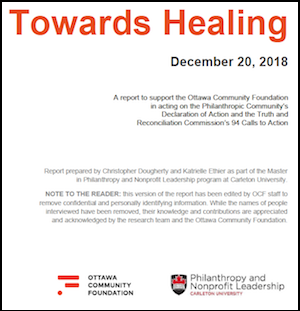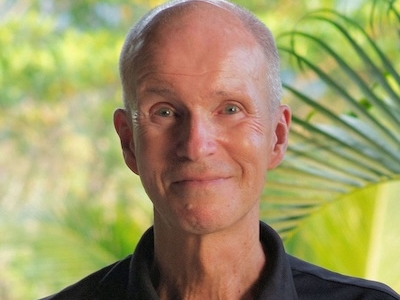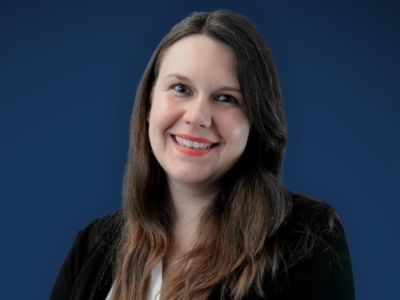The Philanthropic Community’s “Declaration of Action” was a commitment made in 2015 in response to the Truth and Reconciliation Commission’s 94 Calls to Action. For his 2018 capstone project, Christopher Dougherty collaborated with the Ottawa Community Foundation and fellow student Katrielle Ethier to address this question.
 What we learned from talking with a selection of OCF grantees and other experts working in this space:
What we learned from talking with a selection of OCF grantees and other experts working in this space:
- Recognize that truth comes before reconciliation. Settler organizations first need to do their own internal work, and this cannot be outsourced. Develop awareness of Indigenous histories and issues. Do your own internal truth-telling, knowing that truth-telling can be hard. Talk internally about what Reconciliation means in your context, and work on the organization’s internal culture. Ask: why do you want to work on Reconciliation, and what do you hope to accomplish?
- Get into communities, meet people, listen and build relationships as a consistent and trusted partner. This takes time, there are no shortcuts. Ensure early on that the benefits will flow back to the community.
- Work on your organization’s strategic priorities and internal processes.
- Recognize that the grant application, reporting and evaluation processes can be barriers, particularly if they’re inflexible, involve pre-set methodologies or require an undue amount of uncompensated work.
- Think about all your foundation’s activities, not just grantmaking. If investment dollars or grant dollars (even donor-directed or donor-advised dollars) are flowing to organizations that are actively opposing Reconciliation or harming Indigenous peoples, this is a major barrier.
What we learned to avoid:
Settler organizations shouldn’t expect or try to take the lead. Indigenous organizations should be leading on Indigenous issues. When settler organizations are working with Indigenous organizations, they should be focused on funding and supporting long-term capacity building (and avoiding short-term projects).
Download pdf: Towards Healing, by Christopher Dougherty and Katrielle Ethier, a report to support the Ottawa Community Foundation in acting on the Philanthropic Community’s Declaration of Action and the Truth and Reconciliation Commission’s 94 Calls to Action.
Christopher Dougherty graduated from the MPNL program in 2019 and is currently a public policy PhD student at Carleton. He has worked and volunteered in the nonprofit sector for 14 years.
Two important parts of the capstone experience of the MPNL program are professional experience for students and research of relevance to the nonprofit and philanthropic sector. Every spring, the program accepts applications from sector organizations to host a team of students on a capstone project in the fall term. Please contact anna.riethman@carleton.ca for more information.
Sunday, December 20, 2020 in Research from Alumni
Share: Twitter, Facebook



